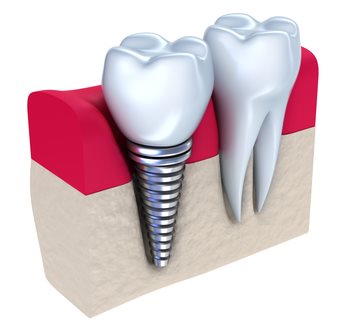
What are Dental Implants?
This amazing innovation in dentistry allows dental professionals to restore missing teeth with minimal discomfort to the patient. Dental implant procedures vary for those looking to replace several missing teeth; however, the components of dental implants remain the same.
Dental implants are comprised of three components:
- A titanium post that ultimately fuses with the jawbone
- An abutment that covers the protruding area of the implant
- A crown that fits atop the abutment, creating a beautiful, natural tooth
Benefits of Dental Implants Versus Alternatives
A conventional denture versus dental implants is hardly a fair comparison.
- Patients who select dental implants will enjoy far more freedom, comfort, and convenience in their daily life. Dentures tend to make wearers feel older than they really are, and they have a tendency to slip and cause embarrassing social situations. Implants allow patients to have complete confidence to eat, laugh, and live life normally again.
- The result of a dental implant procedure is a natural looking tooth that no one but you will ever know is an implant. Achieving these remarkable results requires only a few appointments with your dental professional. One major complaint by denture wearers is the need for frequent adjustments to ease discomfort from ill-fitting prosthesis – a side effect of gradual bone loss. Dentures may contribute to bone loss in regions where teeth are missing, allowing the bone to weaken and erode further, while a dental implant’s process of osseointegration (the fusing of the implant) provides excellent stability just like a natural tooth.
Am I a Candidate for Dental Implants?
Your initial appointment with your dentist will help you determine whether you are a good candidate for a dental implant procedure. Some considerations are:
- Medical Health – Pre-existing conditions will be addressed on a case-by-case basis; however, with exception to growing children, dental implants are a likely solution for most individuals, even those with high blood pressure or diabetes.
- Problem Teeth/Gum Disease – Problematic teeth and gums don’t eliminate one from dental implant candidacy. In fact, most implant procedures performed on patients with previous periodontal disease or severe tooth decay are successful as long as the dental issues are addressed and managed appropriately.
- Currently Wear Dentures/Partials – Dental implants can easily replace removable dentures or bridges and can even be utilized to stabilize and secure existing dentures to increase their comfort level.
- Smoking – Smoking can decrease the rate of dental implant success; however, smokers are not immediately eliminated from dental implant candidacy.
- Severe Bone Loss – Very common among those with problem teeth and periodontal disease, bone loss can be remedied with the aid of a maxillofacial surgeon or periodontist through a bone graft procedure.

